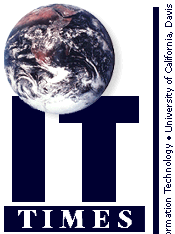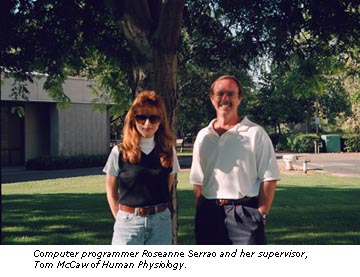
From Administrative to Computing Support:
It's All About Change
by Aviva LuriaAsk Roseanne Serrao and she'll tell you that making a career move entails a certain amount of risk. A combination of faith in her own abilities, avid interest in computing, persistence, willingness to learn, and hard work helped Serrao make a risk pay off.
As an administrative assistant in the Institute of Transportation Studies (ITS), Serrao had been hired to provide clerical support to the associate director. But she found herself drawn to the computing end of things. Technical support for her department was provided by Engineering's Academic Computer Support unit (EACS). Serrao learned about maintenance and troubleshooting by watching the technical staff in action. In addition to assisting with the replacement of routers, Serrao installed new computer hardware, and took care of software downloads and upgrades for her co-workers. But when another administrative assistant left, Serrao was swamped. She had enrolled in the Technical Support Program, but performing her job duties in addition to another person's meant she had little time for classes. Instead, she studied on her own time.
"I used CBT [Computer Based Training courses] quite a bit for Windows NT, TCP/IP, and network concepts," Serrao says. "I bought a PC so I could take the CBT courses at home." The classes helped, but Serrao found it took hands-on experience for the lessons to be meaningful: "It's when you're out there doing it that things start to click for you." So she signed up for the CRS (Computer Resource Specialist) pool, a program that provides the campus with technically-skilled temporary workers. And she gave ITS her notice.
"It was a bold move," she says. "I had to sit my husband down and tell him I was quitting my job, because I'm the benefit holder in the family. But I thought that if I put myself in the position to be trained, I would learn."
Immediately upon Serrao's handing in her notice, the EACS team hired her, through the CRS pool, for a six-month assignment. EACS Director Tom Fortis says he was impressed from the start with Serrao's interest in learning about her office's computing systems. "She seemed to have an aptitude for many aspects of computer technology," he says. Serrao's administrative background came in handy. "She was the perfect person to deal with the problems that arise on a daily basis in the administrative offices," says Fortis. "Problems with email, word processors, and spreadsheets were most common."

"I said, 'Let me think about it and I'll call you back,' " says Serrao.
With encouragement by Fortis, Serrao did attend the interview and was offered the job.
"Roseanne is very ambitious by nature and has been anxious to learn the functions of her job description that she was inexperienced in," says McCaw, noting that Serrao had experience on the Macintosh side but lacked training on the PC side. "She's taken it upon herself to enroll in a myriad of classes offered through UC to educate herself."
"They have been so supportive and patient," Serrao says of McCaw and co-workers Roger Adamson and Dennis Waring, "and I'm always teasing myself and teasing them that I just don't know enough. I don't think you ever get to a point in this field when you become comfortable — things change every day. It's been a lot of learning and it's starting to feel like I'm of real assistance to them now. That was my main goal."
What are McCaw's feelings on hiring employees to learn on the job? "I personally have experienced very positive results," he says. "The employee feels that you have provided faith in their ability to learn and perform the job, and in most cases, the positive results are a reflection of this."
Serrao is preparing her department for Network 21 cutover in September and a host of new computer hardware that will arrive in the fall. "I find that in a new position, things change so much that you have to be very open to change," she says. "If you're willing to do that it works out well. It's all about change."